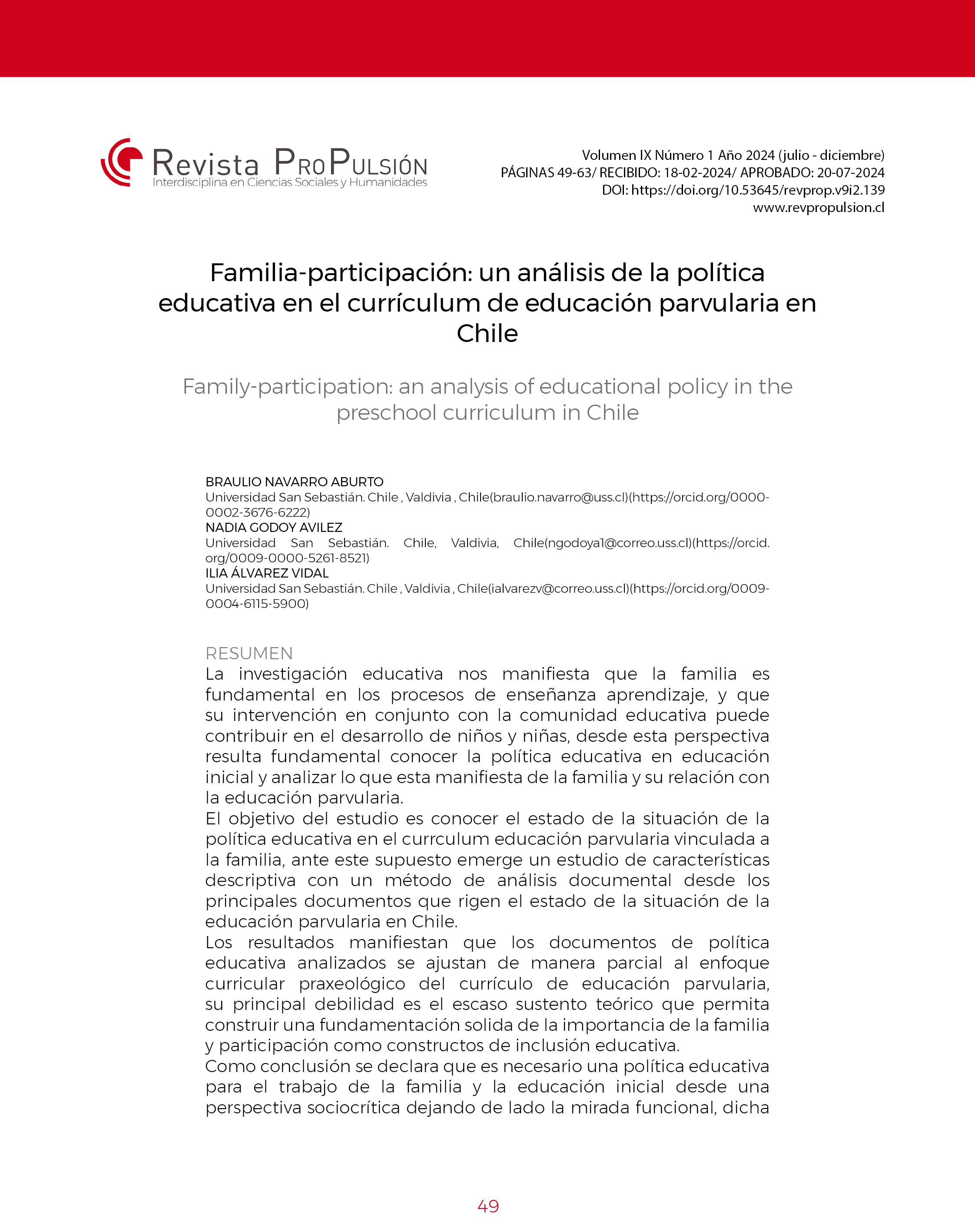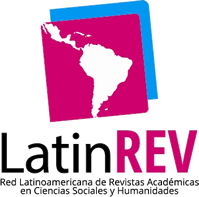Family-participation: an análisis of educational policyin early childhood educatión in Chile
DOI:
https://doi.org/10.53645/revprop.v9i2.139Keywords:
Family, participation, educational policy, initial education.Abstract
Educational research shows us that the family is fundamental in the teaching-learning processes and that its intervention together with the educational community contributes to the development of children. From this perspective it is essential to know the educational policy in initial education and analyze what This manifesto of the family and its relationship with nursery education.
The objective of the study is to know the state of the educational political situation in preschool education linked to the family. Given this assumption, a study of descriptive characteristics emerges with a method of documentary analysis from the main documents that govern the state of the educational situation. kindergarten in Chile.
The results show that the vast majority of the educational policy documents analyzed do not have a solid theoretical basis to substantiate the importance of family participation. On the other hand, a functional view of the topic is evident from an educational space that is clearly sociocritical.
In conclusion, it is declared that an educational policy is necessary for family work and initial education from a socio-critical perspective, leaving aside the functional perspective, said policy must be focused on participation as greater collaboration between all the actors involved in the education of boys and girls, which in turn would contribute to improving the quality of teaching and learning at this crucial stage of child development.
Downloads
References
Referencias
Cárcamo, H. (2015). La familia como enemigo: imágenes que los futuros titulados en maestro de primaria de una universidad pública de Madrid poseen sobre la relación familia-escuela en un contexto multicultural. Revista de Estudios Transfronterizos. 2, p. 41-65.
Canales, A., Muñoz, D. (2008). Participación de la familia en el jardín infantil estatal. Una mirada desde la vivencia de sus actores. Universum. Revista de Humanidades y Ciencias Sociales, vol. 2, núm. 23, p. 38-65.
Corbetta, P. (Ed.). (2006). Metodología y técnicas de investigación social. España.
Flick, U. (Ed.). (2007). Introducción a la investigación Cualitativa. Madrid, España: Ediciones Morata.
JUNJI (2005). Política de Trabajo con Familia. Junta nacional de jardines infantiles. Subsecretaria de educación parvularia, Chile. https://shre.ink/DWdd
JUNJI. (2018). Políticas Regionales de Reconocimiento y Participación de las familias. Subsecretaria de educación parvularia, Chile. https://acesse.dev/S8Dp6
JUNJI. (2017). Manual modelo de gestión de calidad en educación parvularia. Junta nacional de jardines infantiles. Departamento de calidad y control normativo https://shre.ink/DWdM
Hwang, S. (2008). Utilizing Qualitative Data Analysis Software A Review of ATLAS.ti. Social Science Computer Review, 26(4), 519-527.
Kliksberg, Bernardo (2001). Falácias e Mitos do Desenvolvimento Social, traducción de Sandra Trabucco Valenzuela, Silvana Cobucci Leite, Sao Paulo, Cortez Editora/Brasilia/ UNESCO.
Lewis, R. B. (2004). NVivo 2.0 and ATLAS. ti 5.0: A comparative review of two popular qualitative data-analysis programs. Field Methods, 16(4), 439-464
Maturana, H., & Varela, F. (Eds.). (2003). El árbol del conocimiento : las bases biológicas del entendimiento humano. Buenos Aires, Argentina: Grupo Editorial Lumen.
MINEDUC (2018). Bases Curriculares Educación Parvularia. Ministerio de Educación. Subsecretaria de educación parvularia, Chile.
MINEDUC (2018). Orientaciones para Promover la Participación e Involucramiento de las Familias en Educación Parvularia. Ministerio de educación. División de Políticas Educativas, Subsecretaría de Educación Parvularia, Chile. https://shre.ink/DWds
MINEDUC (2020). Estándares Indicativos de Desempeño para los establecimientos que imparten Educación Parvularia y sus sostenedores. Unidad de Currículum y Evaluación Ministerio de Educación. https://shre.ink/DWdg
MINEDUC (2019). Marco para la buena enseñanza en educación parvularia. . Ministerio de Educación. Subsecretaria de educación parvularia, Chile. https://shre.ink/DWdp
MINEDUC. (2023). Marco para la Buena Dirección y Liderazgo de Educación Parvularia. Subsecretaria de educación parvularia, Chile. https://shre.ink/DWdr
ONU (2012). Declaración universal de los derechos humanos. Organización de naciones unidas. Ginebra, Suiza.
Reveco, O. (2004). UNESCO, Participación de las Familias en la Educación Infantil Latinoamericana. Santiago.
Rodríguez, G., Gil, J., García, E. (1996). Metodología de la investigación cualitativa. Ediciones Aljibe. Granada (España).
Rousseau, J. (2008) El Contrato Social. Editorial. Maxtor. Reimpresión
SEGEGOB (2005). Propuesta Metodológica para Mejorar La Calidad de la Oferta Gubernamental de Participación en Políticas Públicas. Determinantes de Calidad. Documento de Trabajo. Santiago.
Serrano, C., (2006). Garantías mínimas de participación social. Participación Social en la Superación de la Pobreza. www.fundacionpobreza.cl/ umbralessociales2006/ cap6.pdf.

Published
How to Cite
Issue
Section
Categories
License
Copyright (c) 2024 Braulio Navarro, Nadia Godoy Avilez , Ilia Alvares Vidal

This work is licensed under a Creative Commons Attribution-NonCommercial 4.0 International License.
- Esta licencia permite a los reutilizadores distribuir, remezclar, adaptar y construir sobre el material en cualquier medio o formato solo con fines no comerciales, y solo mientras se dé atribución al creador.Incluye los siguientes elementos: POR – Se debe dar crédito al creador NC – Solo se permiten usos no comerciales de la obra.







